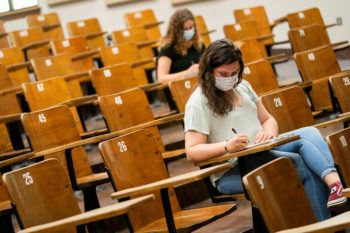Finishing The Semester Strong

In 2020, feelings of isolation, frustration and anxiety are normal reactions students may be feeling during an abnormal situation.
And while stress is to be expected during a global pandemic, students may find themselves experiencing emotions and barriers that they’ve never encountered before. Mary Ann Covey, director of Counseling & Psychological Services (CAPS) at Texas A&M University, said these challenges began as early as March for some students.
“You have some people who have never had to create their own structure really struggling, whether that be regularly attending class on Zoom, getting up at a certain time, exercising, eating healthy,” Covey said.
Combined with a lack of social connection due to social distancing requirements, concerns about health and adapting to a blend of virtual and in-person learning, the fall semester has been tough for many.
However, Covey said, it’s not too late to finish the semester strong. How students respond to setbacks is important.
Things You Can Control
Covey said it’s important for Aggies to create an environment where they show compassion for themselves. We tend to be more critical of ourselves when we’re not accomplishing certain tasks or performing at the desired level. She recommends that students ask themselves how they would respond if a friend told them they were going through a difficult time.
“People will say, ‘I am so much nicer to my friends and other people than I am to myself,'” Covey said. “People feel like, ‘If I’m just always critical, that’s going to motivate me to do better.’ But what they’re not getting, often, is that it’s hurting you way more than it’s helping you.”
CAPS recommends that students practice self-compassion. Acknowledge the feelings you’re experiencing and be kind to yourself with the knowledge that with persistence, you can make it through this period.
It’s also important to maintain a routine. CAPS recommends having control over your day-to-day activities that set you up for success, such as good sleep hygiene, eating well and exercising, all of which are good for physical and mental health.
There are several other things students can do to support themselves. You can:
- Connect with others via phone or video services like Zoom and reach out to people you trust
- Identify things you are hopeful about or grateful for
- Avoid excessive media coverage of the pandemic
- Meditate, journal, read, or develop a new hobby to challenge yourself
- Expect that it is normal to feel a variety of emotions and talk with others about how you are feeling
Coping Tools
Stress is to be expected, but anxiety can be debilitating. In the moment, pause and take some deep breaths. CAPS also offers many self-help resources online, including an anxiety toolbox workshop that provides life-long tools that can be used during situations that trigger anxiety.
Other resources are available to help students build skills that can help them set goals, be empowered to make the right choices and more. These workshops are available in video formats on the CAPS website.
For students struggling academically, Covey said it can help to talk to professors and be clear about what they have and haven’t been able to accomplish.
Texas A&M also has an after-hours mental health service, HelpLine, for students to call to talk about fear, stress and anxiety related to the COVID-19 pandemic. Student volunteers can talk with callers about academic worries, feelings of loneliness, relationship issues and more.
If students feel they could benefit from speaking to a professional, CAPS is offering single-session appointments through the end of the semester. To schedule an appointment and meet with a counselor, visit CAPS’ services webpage.
Media contact: Caitlin Clark, caitlinclark@tamu.edu




